Text
Man not to be a downer but seeing so many ppl in this fandom who insist that jc was an excellent parent to jin ling makes me think that either y'all did not have parents anything like jc, or you did and you're trying to protect yourself from the reality that your parents kind of fucked up on some stuff
63 notes
·
View notes
Text
roscoe’s thoughts on writing, or, how i learned to stop worrying and actually finish my stories
Before I get into things, I want to be clear: I write as a hobby. It is a hobby I take seriously and that occupies a lot of my time, but I am not trying to become a full-time author as a career, and so this advice is specific to someone who writes fiction and occasional creative non-fiction as a hobbyist.
I’ve spent a lot of time feeling jealous and pessimistic over other people’s high productivity. I write a lot, but the amount of time I spend writing relative to how much of it ever sees the light of day is pretty egregious. I have a lot of ideas and a lot of passion and I enjoy the process, which is how I’m able to continue doing it, but it’s hard sometimes when I’m reminded of how inefficient my process is compared to many other people. However, I have become somewhat less inefficient than I used to be, and I have picked up a habit or two over the past few years, and will try to go into them here in case they could be useful to someone.
I can’t promise all or any of this advice will work for anyone else, but these are the things I would go back and tell my twenty-year-old self who despaired of being “slow” at writing and struggling with time management and self-doubt when I compared myself to many other writers I know. I am not trying to be a motivational speaker bullshit artist for clout, I am simply articulating elements of my lived experience in case it could be useful to anyone else. I say this because it’s really, really important to me to establish that I don’t think that I have any kind of inherent gifts or advantages that have led to me writing at my current level of (relative) confidence and consistency. These are learned behaviours. Not least because, like, 75% of my writing advice boils down to ADHD management tips that are not specific to writing.
PERSISTENCE OVER STRICTNESS, OR, FUCK “DISCIPLINE”
If there’s one principle I want you to take away from this post and which is at the heart of a lot of my personal reorientation towards writing as an activity, it’s that of persistence, not strictness, and doggedness over discipline. Or, rather, doggedness as a different kind of discipline which is less outwardly visible, but which is much more workable for me, and likely for lots of others. The key is to set yourself up with expectations you cannot fail, or which are difficult to fail, while remaining engaged through giving yourself challenging projects. This may seem confusing and contradictory, but I hope to explain in further detail so you’ll get what I mean.
To illustrate: one of the most common pieces of writing advice is to “make yourself” write 200 words a day, every day--or 300 words, or 80, etc. The number doesn’t matter much. The idea is that this is a manageable amount of writing that’s easily achievable in half an hour or so, and by doing this on a rigorous schedule, you will end up with a novel in no time. It may or may not be tied to “do something every day for 30 days in a row and you have a habit,” which is another common piece of advice for people seeking to improve their lives through self-discipline. This is all well and good! I’m sure this advice works for many people. This advice does not work for me, however, and the key is that bit about “making yourself” do something. Because nothing is counterproductive to accomplishing things if you’re someone like me (which might mean you have ADHD; a lot of this post is inclined toward people with this diagnosis or similar brains) like a) creating a sense of obligation and b) putting on pressure to maintain a “streak” that can be destroyed by a couple off-days.
Don’t get me wrong; I am absolutely not saying “only ever write when the stars all align in the perfect conditions and you feel perfectly inspired.” I would never finish any projects if this is what I did. But when I say “doggedness over discipline,” I mean that streak-counting is counterproductive. It doesn’t matter how much you wrote yesterday. It doesn’t matter how much you’re going to write tomorrow. What matters is getting yourself to write something as often as you are able to do so, which in turn means figuring out what the barriers are to you getting more writing done, so you can develop skills that empower you to reduce those barriers so you can write more, or more easily, or with less stress involved. That’s it. You don’t need to implement some pat five-step systematized methodology that involves maintaining a consistent incremental habit you’re supposed to perform daily so that you can feel bad about yourself when you miss days, or don’t hit your weekly word count goals, or whatever. Fuck that!
The only goal that I’ve found to reliably get me to see projects through is how badly I want to complete the project itself, on its own merits, because I care about it and want to share it with other people. Obviously, it would be nice if that doesn’t take forever, but it’s gonna take as long as it’s gonna take, and maintaining a stubborn sense of optimism about my ability to achieve that is more effective 100% of the time than drafting some complicated writing schedule that attempts to quantify the process only so I can lapse out of it five days in and then feel like a fuckup and quit writing for a month out of residual shame for being a flake with bad self-discipline, and so on and so on. If your hobby is making you experience guilt and negative emotions you learned in school, the mentality you’re approaching your hobby practice with may not be the right one for you. But you can change that! There are no rules. You can do absolutely whatever you want. You are in charge of your writing experience.
So, when I say, “set yourself up with expectations that are difficult to fail,” I don’t mean “commit to writing 50 words every single day.” If you can do that, awesome! But there are absolutely days I can sit at my laptop wanting to write for four hours and not be able to come up with 50 words. This isn’t because I don’t write very often or very much; I’ve averaged about 5k words of raw writing* a week for the past six months. I write a lot! But there are days I just can’t. I have gotten a lot better at forgiving myself for that, knowing when to let go or to change tasks, and most importantly, making sure that the expectation I have for myself is maintaining a desire to finish the project. That’s literally it. Because sudden loss of interest is the mind killer, the little death that brings total obliteration etc etc.
(*I’m going to talk about what “5k a week” actually means/looks like in my case in a little bit, because it’s probably less impressive than what you’re imagining. But just as C’s get degrees, garbage word vomit gets projects completed. Most of the time.)
Another aspect of this is that I have chronic physical and mental health issues and simply cannot “bet on the future” re: my own time/energy/capacity. I just can’t trust that I will be able to follow through, because a week of good days can be followed by a month of bad days with little to no advance warning. It sucks but that’s simply how it is, so the trick, IMO, is to be be forgiving and generous to yourself, especially on off days, while also figuring out ways to expedite the process of off days/periods going away faster, or at least getting a strong sense of your specific limitations so you can work within them.
This does mean I have to accept the inevitable FOMO that comes with not getting to participate in events like Nanowrimo, because that is an excellent example of setting myself up to fail (oops on day 3 I failed to maintain my 1.6k or whatever->time to just NOT WRITE ANYTHING FOR THE REST OF THE MONTH out of shame!!!!). These intangible goals of “keep wanting to write the project” and “keep chipping away at the project” are less satisfying in an incremental sense than being able to maintain the wordcount equivalent of a Duolingo streak, but they’re ultimately more achievable for me, which means I accomplish what I set out to do, which is… producing completed projects.
WHAT TO DO IF YOU JUST NEVER EVER HAVE YOUR SHIT TOGETHER, OR, LESSONS FROM ADULT ADHD WORKBOOKS
Fallow periods are important and inevitable. I really appreciate the way the authors of this post describe it in terms of “mental crop rotation.” But if you regularly struggle to get past the initial agony of putting words down on the page, it might be worth asking yourself, what are the barriers to doing it? What’s keeping you from doing it more, or in a way that’s less stressful for you?
The 50 Tips of Adult ADHD Management list by Edward M. Hallowell and John J. Ratey is one of the shortest reads that I can truthfully say changed my life; obviously the difficult part is putting them into practice, but some of the advice here was what I really needed to hear at age 20, when I had been struggling for so long believing my problem was generalized MAD or MDD. Section II of this list, “Performance Management,” is particularly relevant here. Just at a cursory glance, here are some of those tips that are directly relevant to my relationship with writing:
Coaching. It is useful for you to have a coach, for some person near you to keep after you, but always with humour. Your coach can help you get organized, stay on task, give you encouragement or remind you to get back to work.
Encouragement. ADD adults need lots of encouragement. This is in part due to their having many self-doubts that have accumulated over the years…. This is not "bad", it just is. It should be recognized and taken advantage of.
Don't feel chained to… conventional ways of coping... Give up trying to be the person you always thought you should be--the model student or the organized executive, for example--and let yourself be who you are.
External structure... Tedious to set up, once in place structure works like the walls of the bobsled slide, keeping the speedball sled from careening off the track.
Make frequent use of: lists, colour-coding, reminders, notes to self, rituals, files [...] colour-coding deserves emphasis. Many people with ADD are visually oriented. Take advantage of this by making things memorable with color: files, memoranda, texts, schedules, etc. Virtually anything in the black and white of type can be made more memorable, arresting, and therefore attention-getting with color.
Set up your environment to reward rather than deflate. To understand what a deflating environment is, all most adult ADD'ers need do is think back to school. Now that you have the freedom of adulthood, try to set things up so that you will not constantly be reminded of your limitations.
Acknowledge and anticipate the inevitable collapse of X% of projects undertaken, relationships entered into, obligations incurred.
Embrace challenges. ADD people thrive with many challenges. As long as you know they won't all pan out, as long as you don't get too perfectionistic and fussy, you'll get a lot done and stay out of trouble.
Make deadlines. Break down large tasks into small ones. Attach deadlines to the small parts. Then, like magic, the large task will get done. This is one of the simplest and most powerful of all structuring devices. Often a large task will feel overwhelming to the person with ADD. The mere thought of trying to perform the task makes one turn away. On the other hand, if the large task is broken down into small parts, each component may feel quite manageable.
Prioritise. Avoid procrastination. When things get busy, the adult ADD person loses perspective: paying an unpaid parking ticket can feel as pressing as putting out the fire that just got started in the wastebasket. Prioritise. Take a deep breath. Put first things first.
Notice how and where you work best: in a noisy room, on the train, wrapped in three blankets, listening to music, whatever. Children and adults with ADD can do their best under rather odd conditions. Let yourself work under whatever conditions are best for you.
Know that it is O.K. to do two things at once: carry on a conversation and knit, or take a shower and do your best thinking, or jog and plan a business meeting. Often people with ADD need to be doing several things at once in order to get anything done at all.
Do what you're good at. Again, if it seems easy, that is O.K. There is no rule that says you can only do what you're bad at.
Keep a notepad in your car, by your bed, and in your pocketbook or jacket. You never know when a good idea will hit you, or you'll want to remember something else.
Read with a pen in hand, not only for marginal notes or underlining, but for the inevitable cascade of "other" thoughts that will occur to you.
Expect depression after success. People with ADD commonly complain of feeling depressed, paradoxically, after a big success. This is because the high stimulus of the chase or the challenge or the preparation is over. The deed is done. Win or lose, the adult with ADD misses the conflict, the high stimulus, and feels depressed.
(I really do think the full list is worth reading, btw.)
“Avoiding procrastination” may seem like a completely impossible prospect. For me, it is! What I’ve found is possible is a) working in concrete ways to minimize the level of procrastination by recognizing both the triggers for procrastination and the behaviours undertaken while procrastinating and b) embrace productive procrastination that is truly productive. I’m productively procrastinating right now by writing this post! I’m supposed to be fiction writing, but I’m writing this instead. This is a case where I’m feeling mentally scattered and I don’t think I’ll be able to approach the writing I want to do with a good heart. This means I’m likely to feel frustrated when the writing doesn’t go how I want, and I’m likely to stop without having accomplished much. I’m choosing to write this post instead because it will get my mind’s pump “primed” to do a similar activity--thinking through ideas at my computer and putting them into words--and it will be a smoother transition for when my emotions are a little more settled. It’s also the kind of procrastination that will leave me with a tangible product I can point to and say, “this is what I did with my time.” A similar effect comes out of procrastinating by cleaning my physical space, or cooking lunch, or going for a walk, etc; the point is to recognize when I get the impulse to procrastinate because I feel anxious about the prospect of starting my desired task [writing], and choosing to procrastinate through activities that are likely to make me feel more grounded and calm. In this way, the procrastination activity can become a bridge to the act of writing.
Does this always work? Of course not! But it does work more often than not, and even if I don’t end up writing, I did something with my time which was a net positive to me. The kind of procrastination that makes me feel the most upset and overwhelmed after the fact is aimless scrolling on social media, because it can often make me feel emotionally drained without having achieved anything in the process. Coming to assess and recognize the emotional condition in which writing is doable for me, and using that information to recreate those conditions, is a way I’ve come to mitigate the negative effects of my impulse toward procrastination.
In general, the biggest thing I got out of really internalizing advice like the above (or other good sources for ADHD management--I’ve heard good things about The Smart but Scattered Guide to Success, for example) is through coming to accept that my brain is never going to work like a lot of people’s do, and that it is probably going to be an uphill struggle to accomplish things, even things I really really care about and really really want, for... ever. That’s not my fault, and it doesn’t come out of weakness or laziness. And once I’ve shifted my mentality around that, the task moves from “push myself into being neurotypical through force of will because this time maybe it’ll stick!!” to “figure out practical and actionable coping mechanisms to make it easier to do the things I want to do.”
WHAT “5.5K A WEEK” ACTUALLY MEANS
When I say I often average about 5.5k a week, what I’m counting includes “glurgy word vomit”, point-form/semicolon outlining/notes, stuff I 100% know I’ll scrap, direct transcriptions from rambling voice memos taken while I wander around my neighborhood talking about fictional characters having sex under my breath, etc; that’s all “writing” to me. If it’s words I’ve committed to a page in service of a project, I count that. I think it really helps me get past the “first draft final draft” mentality to include stuff in my draft documents that truly cannot make it into the final draft because it’s literally not prose, it’s just scaffolding to get past parts I feel stuck on or don’t feel like writing at any given moment, so I don’t stare at the blinking cursor and get increasingly smad about not knowing what to say. Goodbye, problem section of the scene! I’ll come back for you another day when I’ve POE’d myself through the rest of the outline!
Here are some examples of what those brainstormy outline bits look like in practice (pulled from my sangyao.txt WIP from the summer, because it’s one of the documents I have where I actually kept all the incomplete draft versions):


Sometimes it’s, like, considerably more extensive than this, and will literally just be a 600 word wall of text where I try to outline the tableau of what I want to get across, so I can then go back and actually make it sound good later on. Doing this isn’t just about pushing past my latent perfectionism (which is also just... laziness, because I don’t want to have to edit and so [tapping side of my head] Don’t gotta edit if you just do it perfectly on the first try!, except of course that doesn’t... work, 90% of the time. For me anyway), but also because what I actually get out of outlining is building a beautiful vision in my head of what I want the story to be to motivate me to stay with it, plus a roadmap to get there. Personally, the outline can’t substitute for the finished product because what I actually want out of it is the gestalt effect of the project, fully executed (as Ursula K. Le Guin says, “If I could have said it non-metaphorically, I would not have written all these words”), but it’s about... like... crafting a shining beautiful image of the story in my heart, because the more detail I put into that the more I want to keep it up and see it completed. Sorry to be corny this is just HOW. I. FEEL!
THE POWER OF FRIENDSHIP
The difference, for me, between making a deadline with a friend or beta reader around turning in a draft, or a portion of a draft, vs. the kind of external deadline I can find stifling, is that turning my work in to a friend is something I actually want to do. My friends are nice and any friend I’d have this kind of agreement with is someone who likes my writing and is interested in reading it. I want the positive validation of their reactions to my work, and so even if I experience some stress around meeting the deadline I made with them, it’s counterbalanced with my active desire to get their feedback. This is the same principle that drives me to finish work to post online, or whatever, but in this case it’s easier because there’s a preexisting agreement that the work is at best unpolished and possibly totally incomplete. I want to give them some work that’s complete enough they can read it and grasp what I’m going for, and hopefully provide good advice as to how to polish it up further, but it doesn’t have to be good. Maybe they’ll just say “this is dope, can’t wait to read the next section.” Whatever it is, the ghost of “Google Docs comments” future is motivational to me, especially when I have the 2/3rds through a project, “I am God’s cursed worm and a miserable hack” blues.
It doesn’t even have to just be about getting people to read things for you, either. Some friends and I are in a small writing-focused Discord server where we can run word wars with each other and generally chitchat about our projects. The positive peer pressure and hype chain is really motivational. I want to write so I can talk about writing with my friends! And it turns out that even when you write as an excuse to do something else, you still get to keep the writing at the end!
You may be noticing a common theme in this post is “positive reinforcement.” This is so crucial to me. I have a little monkey brain. I can’t say that every single second of writing is joyful and fun and not agonizing or frustrating or stressful. But what keeps me doing it consistently is that the overall experience is one of having fun, feeling inspired and energized, and striving toward accomplishing things that I can be proud of. If it genuinely was just a miserable slog all the time, I couldn’t do it. And there have been times in my life I haven’t done it, for extended periods, and it’s because I lost touch with the things that make it fun to me.
OTHER MISC PRACTICAL STRATS
A lot of this is obvious and/or common writing advice, but I only mention it because these are lessons I’ve had to learn the hard way--please trust me that, if I’ve said something at any point in this post that sounds condescending or like advice that doesn’t need to be given, I’m only saying it because at some point it was advice that I needed to hear.
Only write stories you actually genuinely care about. Cannot overstate this enough. Don’t write things out of a sense of obligation, it will. not. work.
Reduce visual clutter in your workspace: it’s shocking how much of a difference this makes for me. Clean your fucking desk @ me.
STOP COMPARING YOURSELF TO OTHERS WHEN YOU’RE ACTUALLY IN THE PROCESS OF WRITING. Re: word count, consistency, technical skill, etc. I know this is way easier said than done but like. You gotta. I don’t mean “consider your work above critique or improvement”, at all, just that thinking about that while you’re writing is just... bad. You can navel-gaze all you want when you’re editing or reflecting on a piece after the fact but don’t bring it to the Google Doc on the first go.
That being said, please please poach techniques/writing process strats from other people as much as you can. Learn how your friends and writers you admire manage their projects/workflow/etc and then trial and error your way into figuring out what works for your brain. Magpie your way into knowing what you’re doing. It’s fun and it’s free.
No one who writes “writing advice” is ever a final authority and it’s completely correct to discard what they say if it doesn’t match up with your lived experience. I don’t care who’s saying it, whether they’re pro creative writing teachers or extremely successful authors, don’t take what they say as gospel. Try their advice on for size, mull over it, use it if it’s helpful, but if it sucks, hit da bricks.
Rotate between workspaces semi-regularly. This is harder than usual in a pandemic when chilling at a cafe or library isn’t possible, especially if you live in a small apartment or have a lot of housemates, etc. As much as you can, though, I think it’s helpful to mix it up. Chill on a rug on the floor lying upside down with your feet up on the wall and free write in a notebook for a bit. It can shake things loose for me!
When you hate a project, step away for a while. Give it to someone else if you can. I cannot recommend taking breaks from projects enough. Putting stories on the back-burner is not a death sentence and double-fisting WIPs to prevent burnout is a completely legitimate strategy.
Write absolutely everything down. Do not trust your memory. Getting creative with phone apps can be useful for this: voice memos (I wander my neighborhood talking through scene blocking with myself and getting stared at by other pedestrians on a regular basis), notes apps (especially if they sync to desktop), a private discord server with only yourself in it where you drop sentences you come up with at 1am on your phone so you can see them on your computer later, etc.
Related to the above, physical paper is invaluable to me when I’m outlining, brainstorming, and researching, and I still probably write ¼-⅓ of all my writing on paper first. This is very inefficient, but it’s more efficient than “staring at my laptop for six hours experiencing ennui”, which happens to me pretty often. I wrote another post about the way I use notebooks for fiction projects and you can look at it here if you want.
Accept the following: you will start more projects than you finish, you will never be maximally efficient with your time, you will sometimes lose interest in things. At the same time, you can learn to set bumpers up around those realities to mitigate damage as much as possible, and sometimes even figure out how to turn positives into negatives. (There’s a whole other post I could write about recognizing your patterns for phasing in and out of hyperfocus so you can exert a little more control over it, but I don’t have time right now.)
The last thing I have to say right now is that one of the most helpful things I ever did for myself was shift my ultimate goal from “I want to be as good of a writer as [x]” to “I want to write like myself, but happier and more confident than I am right now.” Every other kind of improvement to my process I’ve talked about here comes out of that shift. In my experience, anyway.
182 notes
·
View notes
Text
roscoe’s notebook post
A while back I said I was going to write a post about the way I use notebooks for writing projects. This is the first of several posts about Writing Process I’ve been tossing around in my drafts for a little while as a result of conversations with friends, so bear with me.
I. Love. Notebooks. I genuinely would have to deeply overhaul my whole Process of writing anything on the longer side if I were to go paperless; I find physical paper pretty invaluable when I’m outlining, brainstorming, and researching, and I still probably write ¼-⅓ of all my actual content on paper first. (That proportion used to be a lot higher, but I’ve gotten better at being productive on a computer in recent years, which is great.) I’m a very visual person, so notebooks really help me visualize my ideas, story structure, etc. It’s very helpful to be able to use arrows and diagrams and physically strike things through, and the tactility is really soothing to me. If I show people my notebooks or talk about them, I often get a response like “this is so organized”, which is sort of true, but I have to stress that it’s “organization for a disorganized mind”; I can’t misplace ideas or notes if it all goes into the same physical object, vs. electronic notes, which are much more, like “Did I say that in a voice memo? PM it to myself on Discord? Leave it in a desktop sticky note? Write it directly into the Google Doc? Who knows! It’s lost to time!”. It’s very much an ADHD management strategy.
It helps that I’m a very neophyte stationery hobbyist and appreciate any excuse I have to use my pens, but I also will go off at any opportunity about how helpful I find them for writing projects, which is why I decided to just make a post about it. Right now I mostly use them for (fan and original) fiction projects, but I used a notebook for a very similar purpose when I was working on my undergrad thesis, and I have a slightly different but equally necessary-to-me approach to notebooks I use at work.
My typical structure for a notebook that’s devoted to one project only looks like this:
I always leave the first couple pages blank so I can go back and retroactively index bujo-style. I don’t always actually do the index, because sometimes I get too lazy, but I like having those blank pages there to give me the option. I also usually put epigraphs/inspo quotes on the first page.
After that, there’s often (but not always, I’ll talk about it) a couple pages at the start where I’m frantically jotting down loose brainstorming ideas before they've coagulated into a story structure. Just, like, vomiting into the void.
Stemming out of that, I usually write out about like 5-10 pages of outline-style notes in chronological order, laying out all the main story beats and charting out the story trajectory. This will inevitably get revised and rewritten many times, but I find the process of writing these wide-angle synopses really useful for dislodging ideas, making connections re: thematic threads, etc. from my brain.
I’ll devote a couple pages after that to specific things like "sex scene brainstorming", "random scene ideas/minor details that don't have a clear place in the outline right now but I'll turn to for inspo later" [this is what I refer to as “bits” in one of the later photos], "page where I just outline the Motifs And Themes", "research notes", "to-do list", "stuff to check on a second pass", "things to put in the a/n and AO3 tags", etc.--the specifics vary with the story.
Then, I skip ahead to approx. halfway through the notebook and cordon off the rest of the pages to be “free writing” space, AKA writing of actual content rather than planning, with the expectation there will be no internal organization and I’ll transcribe to laptop as I go. Writing on paper feels less binding than typing something on a computer; it’s like a little secret kept with myself, and it doesn’t need to go anywhere or be seen by anyone if I decide I don’t like it. Setting aside pages in the back half of the notebook means that, as more things come up re: planning, I can go back and add those in the rest of the pages that were intentionally left blank. This is how I avoid (for the most part) having the whole thing be a jumbled mess where there’s no separation between the notes and the actual story writing; I learned this the hard way via the first notebook I’ll show you in a second. I’ve recently gotten really into using Muji sticky note tabs to label any pages/sections of particular import that don't want to have to refer back to in the index and would rather just flip to instantly.
I do use notebooks that aren’t specific to any one project, but those are much less organized and less worth sharing.
Before I look at more recent stuff, here are some selections from my notebook for the project that got me into writing longfic, my Golden Kamuy canon divergence AU (with apologies for the bad photos, my phone’s camera is trash). I worked on this from Sept 2018-July 2019. It was a learning experience in a lot of ways, and notebook utilization was one of those. I’ve always used notebooks for keeping track of writing projects, as I said earlier, but before this it was largely without much organization or structure; just total chaos. Having a physical notebook became really important for this project because it was a sprawling multichapter story with rotating POVs and a lot of historical research. I also learned a lot about what not to do with a notebook, personally, or at least things that don’t work so well (for me). This was a college ruled spiral-bound Decomposition Book, for the record.
By the time I bought a notebook for it I already had a (very basic) plot outline in mind, so I wasn’t doing that very initial ground-zero brainstorming in here; I was copying out of my phone’s notes app, basically, and then going from there.
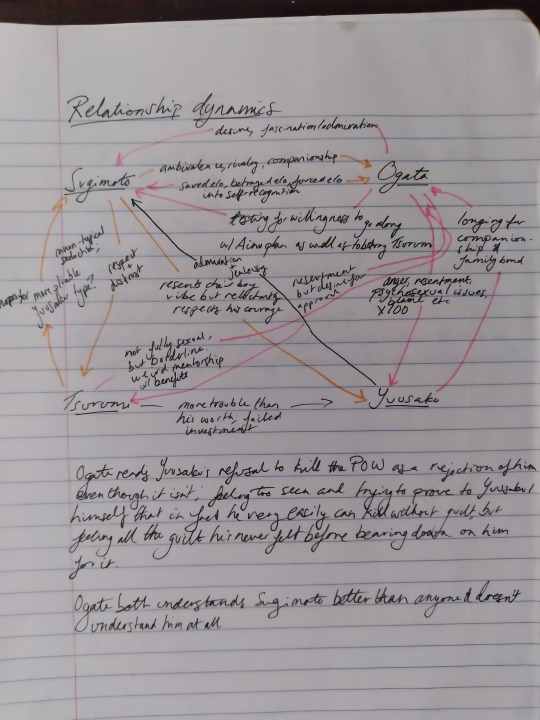
This is one of the first pages in this notebook; I wanted to visualize the relationship web between the four central characters in the story in terms of how they feel about one another. The two colours correspond to the POV characters (Sugimoto in orange, Ogata in pink), and I used this colour-coding throughout the notebook with highlighters, etc. to keep track of information that was more relevant to one character than the other. Tsurumi and Yuusaku aren’t POV characters, but they’re prominent in the story and their presence impacts the central relationship between Sugimoto and Ogata, and it was helpful to me to map out the emotional ecosystem, as it were.
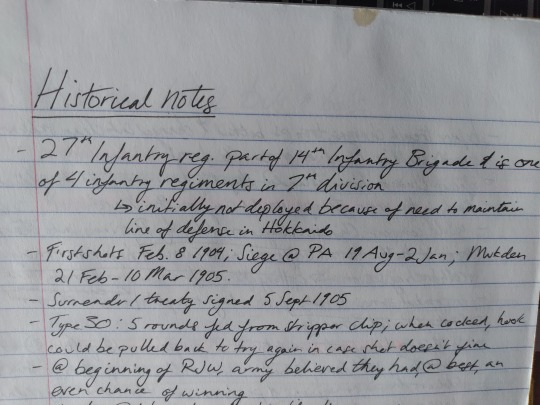
(There are coffee stains all over this, because I wrote the vast majority of the story in coffee shops because I didn’t want to be around my roommates, lol. This is part of why I never do fiction writing in notebooks that are too nice, I get neurotic about needing to keep them tidy. I can’t use ones that are too shit though, either, so it’s a bit of a narrow window. I’ll talk more about brands and paper quality etc. later.)
As you can see, this is the first page of many I set aside specifically for jotting down different pieces of historical information relevant to my story. It’s about fictional characters who are members of an army division that existed in real life, and both the canon and my fic involve a high level of attention to detail with regards to which divisions were present for which battles, etc., as well as general historical details specific to the Russo-Japanese War setting--what did people eat in the trenches? What did they do to fill time? How did they get through the winter? What did third party observers have to say about the conditions? What were the specs of their weaponry (particularly important because one of the POV characters is a sniper and gun nut)? I did a lot of reading (and watching of antique gun collector Youtube videos... the things I do for love, eh), and it came in handy so many times, because it turns out it’s much easier to write trench warfare slice of life if you have factual details to pull from when you don’t know what to do with a scene! Imagine that!
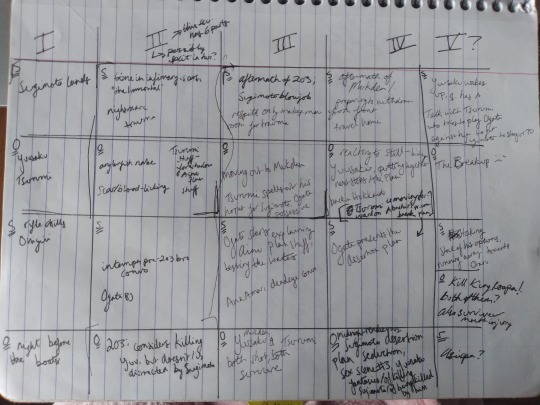
This is the first of three “grid outlines” I made; this is a way I sometimes like to visualize a story outline all on one page, with the columns representing chapters and the squares within the columns representing sections/scenes within the chapters. As you can see, early on I was hoping to get this done in five or even FOUR chapters (whatmakesyouhaha.mp3), with POV switches happening internally within the chapters. This proved to be unwieldy for many reasons, so I revised the outline:
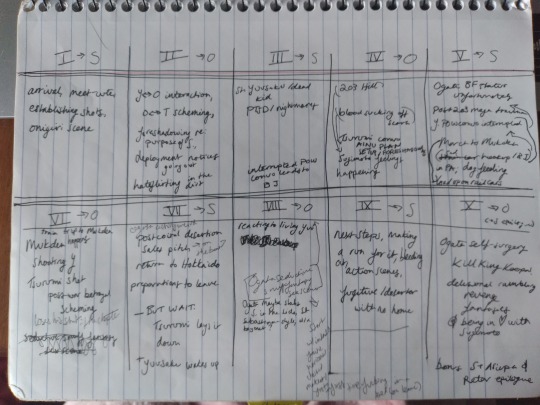
Here I’d come to terms with the fact this story was going to have a lot more chapters than I’d planned, and I rearranged things so that it would happen in ten, with each chapter belonging to only one POV character. This also needed revising later, and in the end the story looked a bit more like this (though it did in fact end up being twelve chapters, but only because Chapter Ten was like, 12k, and needed to be split in two chunks):
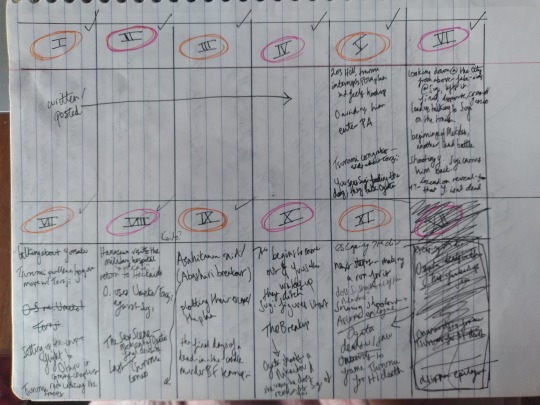
I must have remembered to bring my fineliners to the coffee shop this time, lol, because as you can see it’s properly colour-coded this time. This outline was made when I was already four posted chapters into the fic, which hopefully gives you a sense of the way in which I am sort of a planner and a pantser; I can’t get into a longer project without an outline, but the outline inevitably changes many times throughout writing and I often end up with a finished product that looks pretty different from what I was intending. My creative M.O. as always is Do The Maximum! Amount! Of! Work! Possible!
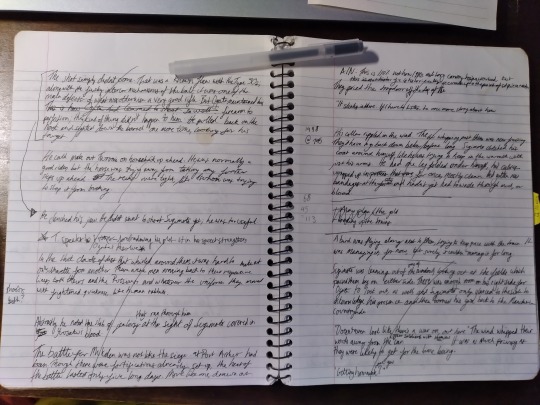
This is what a “free writing” page looks like, for me. In this notebook I didn’t set aside any specific spaces for free writing so it’s strewn throughout the notebook in a really disorganized way and I was constantly flipping through looking for bits I’d written and forgotten to transcribe, and I decided to be more organized in future as a result of that. If something’s crossed through, that means I transcribed it. As you can see, they’re often small sections, sometimes just a coupled decontextualized sentences. About 3/4 of what I write in a notebook makes it into the story, I’d say; some of it never goes anywhere, and that’s OK. I have less of an issue killing my darlings if they never make it off the paper page.
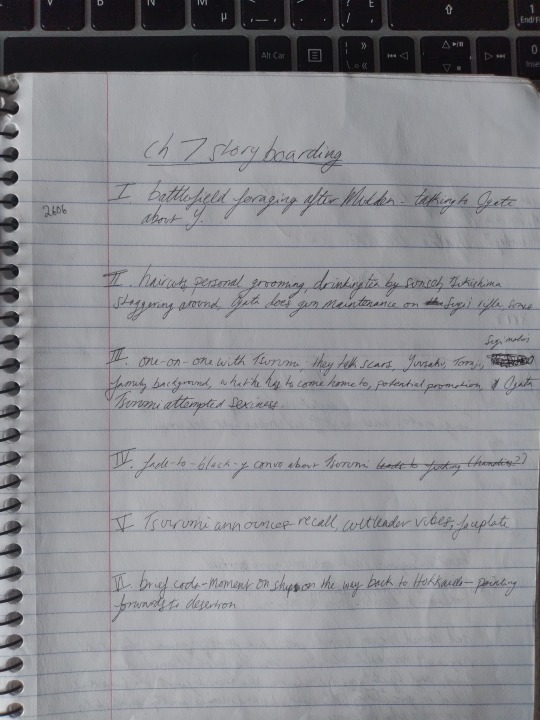
A very brief, top-down chapter outline, where the goal was not to get too bogged down in details and just to visualize the beats and pin down what they’re trying to accomplish. Chapters for this fic typically ran about 6k, and five or six scenes per chapter was pretty common, so the average scene length was about 1-1.25k words/scene. IDK why I called it storyboarding when I didn’t make drawings. (Margin numbers are to keep track of word count, since I was using a daily word count tracker while writing this.)
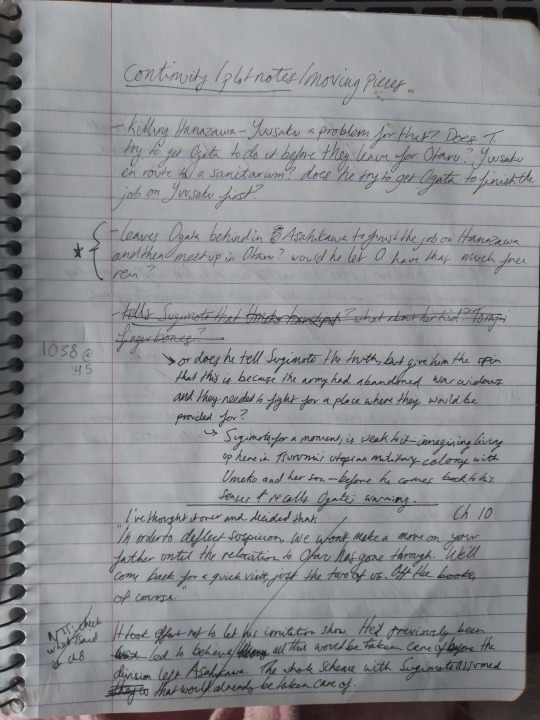
This page was, as titled, for keeping track of the various balls in the air when I was about 2/3-3/4 of the way through the story and really feeling the pressure with regards to tying up the various loose ends. This was... a struggle. I hadn’t ever written anything longish (this fic ended up just under 70k) that had an action plot before, let alone a canon divergence scenario where I had to engage with and explain away various canon plot elements so I could maintain the audience’s suspension of disbelief.
Now, I mentioned earlier that I learned various “things not to do” with my notebooks while working on that project. One of those lessons I learned is to be more realistic when assessing how big a project is likely to get, not least because I RAN OUT OF PAGES around the chapter 9-10 mark. In my defense though, that’s because I’d never written anything even half this long! But I know better now, and try not to be in denial. Finishing the notebook early was a way bigger problem than I’d anticipated, and was part of the reason the last few chapters took several grueling months to finish. The issue was that I needed to be able to use a notebook to maintain my workflow--attempting to do it only on a computer was dismal--but it seemed silly to start a notebook of a similar size to the one I’d finished (80pg, approximately B5 dimensions) when there was no way it would need that much space, especially since the reference pages, like the historical notes, didn’t need to be transcribed over. I was also pretty broke at the time and didn’t want to spend money unnecessarily, lol. I tried to get by using a Moleskine Cahier for a month or so because I had one lying around, but it was horrid; it was too small to be used comfortably, it wasn’t spiral-bound so it wouldn’t lay flat, the ghosting is terrible and I hate the way Moleskine paper feels, etc. Eventually I caved and went to Muji and bought a 30ish page A5 with closer to lay-flat binding, and I finished the story in there. I would take a comparative pic for you of the relative notebook sizes and include some of the scene staging diagrams, etc. I put in there, but I can’t find it :(
So I learned that specs really do matter, and it’s okay to be picky if the pickiness is going to make the difference between actually using a notebook or not. Things that are important to me in my notebooks:
Ruling (gotta have ruling, I can suffer through grid but blank or dot is a no-go)
Size (I can’t use anything smaller than at least a medium-large notebook, I find it claustrophobic and get miserly about page space)
Binding (twin ring is my preference because it looks and feels better than a classic spiral but has the same comfort of use with regards to bending the pages back to suit workspace size and laying flat with ease)
Paper quality and colour (I don’t like anything too slippery/smooth or with too much visible ghosting, and I strongly prefer an off-white paper to bleached paper--part of why I don’t use Decomposition Books anymore, the paper is scratchy and it’s too damn bleached!)
Pagecount relative to size of project
Portability (in non-COVID times; anything bigger than a B5 wouldn’t fit in the satchel I used to bring to work at my old job), etc.
But everyone’s taste is different in this respect, and the only way to figure out what works for you is through trial and error, I’m afraid. I also suspect I’m more neurotic and particular about the sensory experience of using a notebook than most people are, but I yam what I yam.
Now to talk about the notebooks for my current projects, where I’ve refined my approach somewhat. I’ve included less photos for these because they’re ongoing WIPs I don’t want to spoil completely, but I’ve tried to include some outline-type stuff to give you an idea.
My big bang fic is in the very ugly twin ring notebook on the right; I got it at a dollar store by my house because I needed something to work in and didn’t want to wait for an online order, but it’s been very serviceable for my needs. The paper isn’t even bad. The bigger notebook (B5) is my Sangcheng fic.
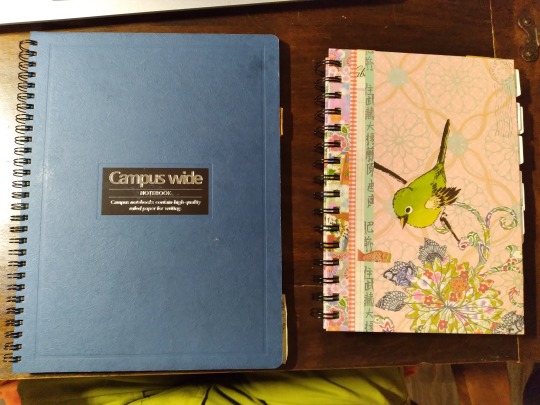
I wanted something with a lot of pages for this, because I knew it was going to be a long story, and for some reason the fact it’s smaller than my usual preference doesn’t bug me (I think it’s an A5?); it just fits this story, somehow. I’m not sure exactly how many sheets are in here but I’d guess about 150.
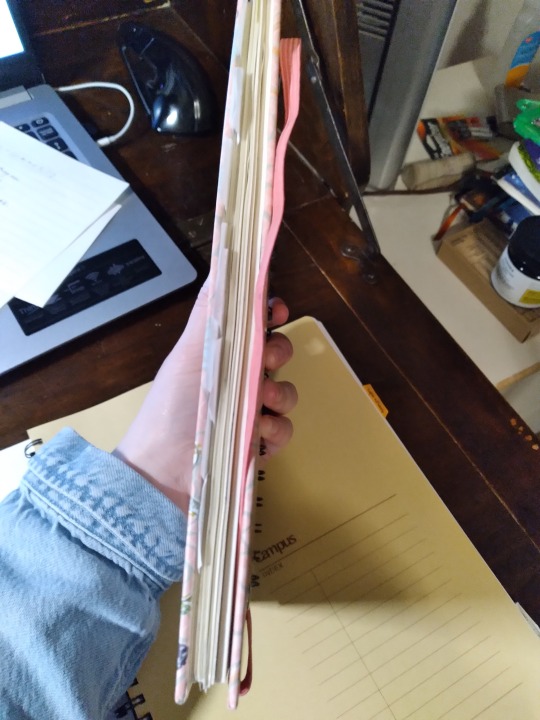
Because this notebook has upwards of 100 sheets, I made a lot of use of sticky-note tabs to label high-priority pages. The colour coding of these doesn’t mean anything, it was just whichever ones I had at hand at any given moment. These are those tabs from Muji I mentioned, I’m really obsessed with them--the shape makes them so much less obtrusive and more practical than conventional squares/rectangles OR flag shapes, IME.
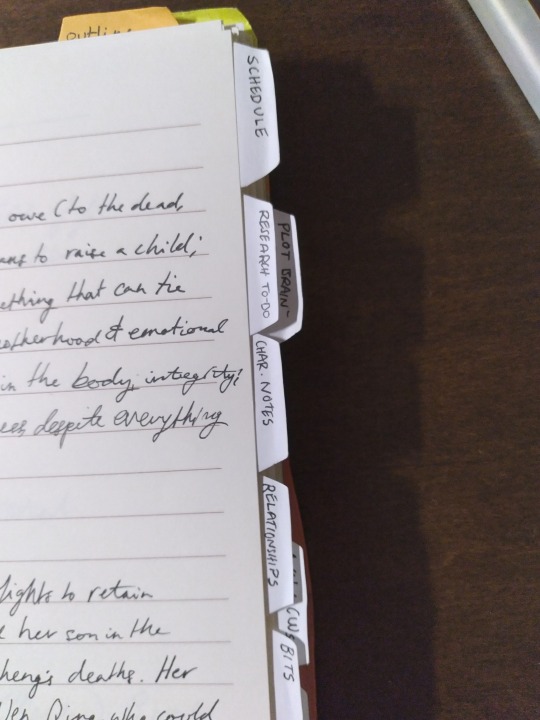
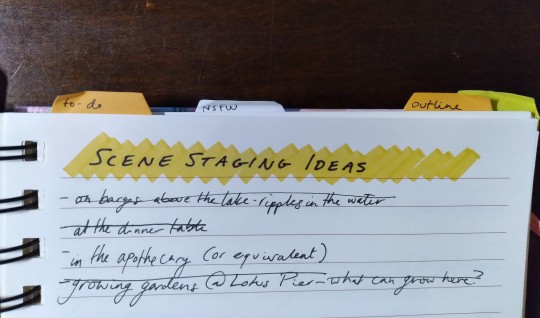
My big bang story is nonlinear, so, similarly to what I did with colour coding for the two POVs for my GK fic, this story has two main colours corresponding to whether a given section takes place in the “before” or the “after” portions of the timeline, with blue as “after”, yellow as “before”. This is what the most current version of the outline looks like in there:
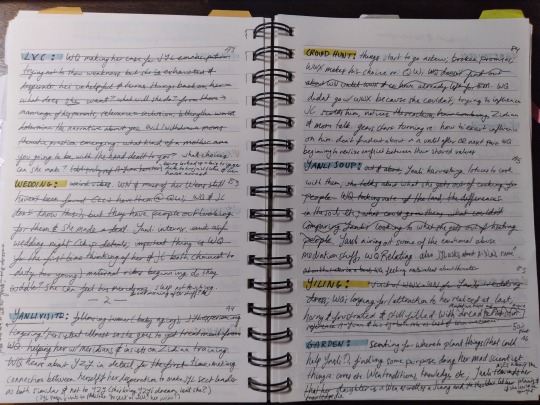
If you squint, you can see the alphanumeric notes in the top right of each section entry; I gave them each a code like “A3″ or “B5″ corresponding to their position in the story sequence (so, it goes A1, B1, A2, B2, etc., through to B9 and then the epilogue). [Unintentional that this schema overlaps with notebook size labeling and so is kind of confusing in the context of this post.] At first I was just keeping track of the sections via the highlighted titles, but it got confusing because I’d write down “Wedding” or “Yiling” in my notes and then refer to the notes later like “but there are multiple marriages?? and multiple scenes in Yiling??”. Stuff gets struck through with a straight line if it’s been written in a more-or-less complete form and crossed out with a squiggly line if it’s been cut from the outline or made redundant.
As I said earlier, I started out all the initial brainstorming for my Sangcheng fic in its notebook, instead of brainstorming it in someone’s DMs/my notes app/a voice memo/etc. and then transcribing it into the notebook in a somewhat more organized fashion, which is how my stories usually start out. Because of this, the first five-ish pages are basically just stream of consciousness rambling where I was trying to jot down every disconnected thought I had about the story concept. I don’t have photos for that because it’s too spoilerific for later developments in the fic, but I can show you some of the stages the outlines went through, once I was able to corral those initial notes into a story structure:
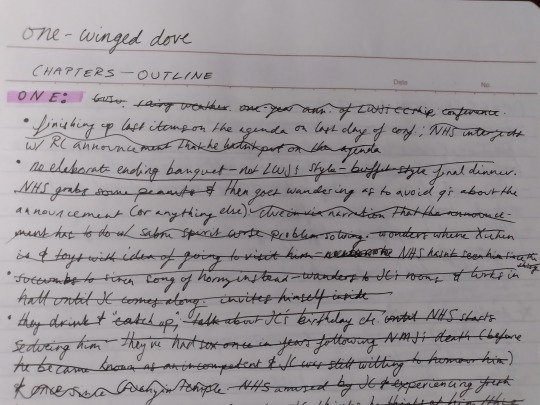
All the chapters in this fic have their own highlighter colour, so when I started trying to make sense of my initial brainstorm notes I just went through and highlighted stuff in the colour of the chapter it would make the most sense for, and then transcribed things more-or-less in chronological order into the relevant chapter outline. I later ended up rewriting all the chapter outlines AGAIN to refine them and divide them internally by the individual scenes, which makes them a lot more legible and less wall-of-text-y. They look like this now, with about four sheets per chapter:
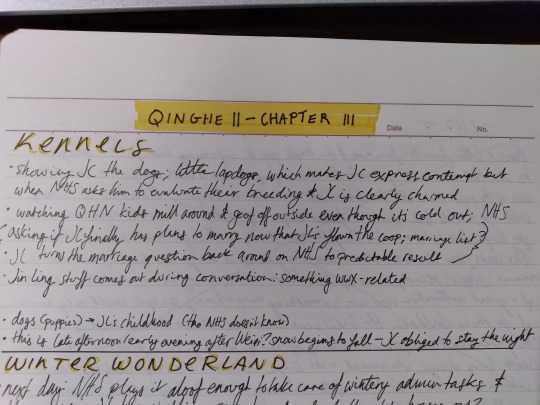
Because this fic is on the longer side, I have some pages that are just for keeping track of other story elements, like this, where I refer back to whatever the fuck the “themes” are supposed to be whenever I forget what this fic is about:
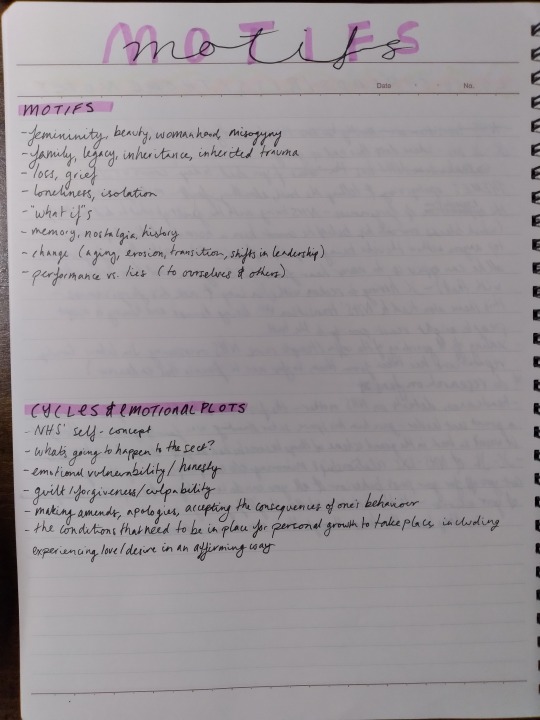
It’s all about the visionboarding... Anyway, that’s most of what I have to offer, since most of these two notebooks is Forbidden Content.
With regards to brands/supplies, I really like this Kokuyo Campus Wide notebook that I’m writing Sangcheng in, it’s pretty perfect for me. I also like the B5 Muji twin rings, but those only come in 30 sheets, so I wouldn’t use it for anything above a ~20k project. The B5 Maruman Spiral Note 6.5mm ruled/80 sheet is another good one, though I wish it was twin ring instead of spiral. As you can tell, I like Japanese stationery brands because it’s easier to find decent paper quality and minimalist design without shelling out $$ than it is with American/European brands, at least IME. I like Rollbahns too. But honestly, I can usually find pretty serviceable random notebooks that aren’t brand-name from Asian dollar stores; it’s really not something where you need to shell out tons of money.
27 notes
·
View notes
Text
nie huaisang, jin guangyao, self-concept, and culpability
This is an archive/repost of an analysis thread I posted on twitter. 4,600w behind the cut, open the readmore on your phone at your own risk.
[ED: I was not expecting this post to get traction in any way and was just typing up a bunch of loose thoughts from Twitter on someone’s request; I would amend several of these statements now, especially re: gender politics; it’s also moderately shipping-brained because these are things that came into my mind while working on fic; it’s much more CQL-informed than MDZS (because NHS has significantly more interiority in CQL); take all with a large grain of salt]
This is an attempt to synthesize and condense a bunch of rants I've gone on at different points in time about Nie Huaisang’s character arc and some of his notable relationships. First, a preamble to my actual points: I find litigating around which bad deeds of fictional characters are excusable vs. which aren't to be pretty tiring, because I don't think trying to quantify fictional characters' ethical responsibility is a particularly interesting way to engage with narrative. I say this because I think a lot about Ethics when I think about Nie Huaisang, but don't want to come across like I think The Point of this post is to reach a fixed verdict on which individual actions are justified vs. which aren't.
One of the major Themes in CQL/MDZS—or at least one I think is particularly compelling—is the relationship between trauma and agency, in the sense of exploring what "fault" actually means when characters are faced with situations in which there are no "good choices", or where the "good" option is either not clearly visible or would involve significant personal loss/risk, especially when characters are entangled in cycles of violence/abuse which make the possibility of taking alternate routes appear even more foreclosed. This is what I find particularly tiring about character analysis that revolves around "well if [x] had simply NOT DONE [y]—" because outside of a handful of specific choices, there are few circumstances in the story where a sympathetic character makes a choice that was obviously wrong or where there was nothing to be lost by taking the other option, and I don’t get the impulse to flatten the stakes by making circumstances more straightforward than they actually are in the interest of soapboxing.
This also works in the other direction, in that "did nothing wrong" readings are a snooze to me. I’m not interested in apologism in the sense of vindication, but am interested in it in the sense of dissecting why characters do the things they do, and laying out the internal logic that lets them rationalize it within their own minds. So the position I arrive at re: most of these characters is, "They did a lot of things wrong but it would've been borderline impossible for them to have done everything right and if they had there wouldn't have been a story so why bother getting mad at them for it. (Also because they aren’t real.)"
This is part of why Nie Huaisang + Jin Guangyao + Jiang Cheng are the characters I think about the most, because I'm interested in the way they justify their actions to themselves in relation to all of the above; to varying degrees, I think each of them thinks some form of "I had to do things this way and there was no alternate option for me" to be true re: various things they've done, & I'm interested in the conditions and personality traits that had to be in place for them to believe that. Related to this is the secondary theme that all actions have widely-reverberating consequences that even best laid plans can't predict, and that choices made in your personal/family/etc life have ripple effects that go beyond those relationships into the lives of others. Once again, this ties back to the significance of intergenerational trauma and cycles of abuse/violence/loss.
In my opinion, Nie Huaisang's character arc is largely about these themes. To start with, I want to speculate for a minute about Huaisang + Meng Yao's relationship back in the day at the Unclean Realms.

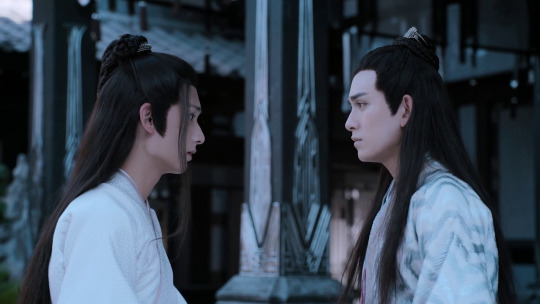
A lot of people have talked about the visual similarity between Huaisang and Meng Yao in CQL's costuming; both on an at-first-glance level, plus things like the infamous headpiece as seen in Meng Yao’s Nie-furen days and Huaisang's Fatal Journey childhood flashbacks.
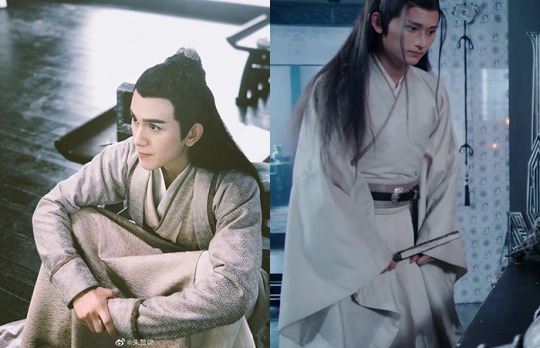
They’re styled and framed together in such a way as to clue the viewer in to the fact there are connections between them that go beyond just "the only two twinks on Qinghe grindr". (Meng Yao isn't the only one who gets this treatment, though, because it happens with Huaisang and all of 3zun at various times. We’ll get to it.)
Thinking about Huaisang's relationship to Meng Yao obsesses me, because it doesn't seem to have any one relationship model it falls into above all others... it's this weird familial relationship/mentorship/friendship, despite in practice being a dynamic between a young lord/clan heir and his family’s retainer. I can't imagine Huaisang had many friends his age prior to the lectures, so there's that element to it, but practically it's also a master/servant dynamic where Meng Yao is obliged to defer to Huaisang and take his commands—except, in practice, Huaisang seems to defer to Meng Yao in serious situations, like the arrival at the Chang mansion. It’s undoubtedly Meng Yao who leads the party into the Unclean Realms, not Nie Huaisang.

The way that Meng Yao responds when Huaisang tells him to keep an eye on XY is really fascinating to me, because it has the energy of taking an order from someone you're babysitting, with the mixture of indulgence and irritation that you would expect. So Meng Yao has this ostensible (and literal) role as Huaisang's inferior within the hierarchy, but he's also Huaisang's caretaker (he says as much explicitly when Nie Mingjue banishes him), who's positioned as having a much higher level of maturity and life experience despite not actually being that much older than Huaisang, as far as I can tell.
(There's a universe in which their relationship at this point in time could come across as brotherly, but it isn't this one. The stepmom/governess energies are pretty overwhelming, probably because NMJ and MY read so… like… that in the drama, but this isn’t a Nieyao post, so I’ll leave it at that.)
I imagine Huaisang was at times jealous of Meng Yao for being valuable to Nie Mingjue for his skills and personality traits, while—love aside, and I think pre-sunshot Huaisang probably at times had that teenage mentality of “[Nie Mingjue] doesn’t even LIKE me!!” due to lack of maturity/perspective on love and Life—Huaisang was valuable to him just for being his heir, which has nothing to do with Huaisang as a person and is also something he actively doesn’t want for himself.
(Huaisang’s insecurity around his brother reads very differently than the way Jiang Cheng says that his father doesn’t like his personality. Though we see him get scolded and avoid NMJ’s eyes at times when NHS knows he’s been shirking his obligations, the majority of the instances of the two of them together pre-Collection of Turmoil, they seem very comfortable in each other’s presence. I tend not to think Huaisang ever truly believed, deep down, that Nie Mingjue didn’t love him; overbearing/short-sighted pseudo-parenting strats=/=consistent patterns of emotional neglect and abuse.)
The skills and interests Huaisang sees as important are where he and Nie Mingjue run into conflict with each other, so to have someone enter their family dynamic (see that thread I linked earlier re: the hairpiece for some analysis on the significance of Meng Yao wearing the family braids) who appears to be more of a kindred spirit to Huaisang than anyone else around, who’s a couple years older than him at most, and who enters Nie Mingjue’s high regard (Huaisang is the one to tell WWX and JC how much Nie Mingjue respects/admires Meng Yao, after all) not because of how well he can swing a sabre around or direct troop movements, but for soft skills that Huaisang could theoretically acquire as well: this could be a blueprint for Huaisang to grow into his role as his brother’s heir, except it never happens, because by the time Huaisang really needs those skills Meng Yao has been banished. The ways Huaisang ends up adopting Jin Guangyao’s blueprint are exclusively in ways that wouldn’t have resulted in Nie Mingjue respecting him, lol.
The difference between the two of them—one of the differences—is that Meng Yao learned how to think and act this way to survive much more challenging life experiences than Huaisang has ever had at this point. Meng Yao’s childhood innocence was never protected, while Huaisang has enjoyed a perpetual extended adolescence.
This leads to contemplation of the other side of this relationship. I assume Meng Yao must have felt a lot of contempt over the way Huaisang, in his eyes, is essentially pissing away all the opportunities life gave him—which is a completely understandable way to feel, considering that Huaisang was born into conditions which Meng Yao has been desperately crawling his way towards his entire life, and has none of the desire to make himself someone who Matters in the way that's deep in Jin Guangyao's bones. Jin Guangyao’s drive for recognition is a response to his circumstances, obviously, but he's also just one of those people who wants to be a mover and a shaker, to be valued and appreciated for his skills, and that's not inherently bad; ambition isn't inherently bad. If Meng Yao was born into Huaisang's position in life I think things would have been very, very different.
This isn't to say that Jin Guangyao is just a poor woobie who didn't have a choice to do bad thingsss (there's always a choice, just not always a good one; themes, innit), but just on the most basic level, a lot of Jin Guangyao's negative or harmful qualities are pretty obviously learned behaviours he picked up in response to things that have happened to him. This Guy Is Just A Guy Who Sucks is not interesting and misses the point on like, 15 levels. But at the end of the day Meng Yao and Huaisang are very different people with different priorities; “not like Nie Mingjue” doesn’t mean they actually have that much in common re: their goals or personalities, and Huaisang doesn’t want the things Meng Yao wants except in the broadest senses (personal security and comfort), which he already has and has no reason to believe are in jeopardy.
To go on a tangent for a minute, I've been rereading ASOIAF with PGOT bookclub & it has me thinking about the way that dynastic models of wealth/power are inherently traumatizing, which is something I don't see folks talk about very often, probably because of not wanting to seem like they're playing tiny violins for rich people, to which I can sympathize. However, I think it’s something worth dwelling on in this context. Familial relationships are warped when high-stakes inheritance, succession, etc. baggage is thrown into the mix; it's not that gentry have it "harder" than commoners (fucking obviously), but relating to your family primarily through a frame of property inheritance and dynastic maintenance and only secondly as actual family members is inherently harmful to the ability to have healthy relationships. Not to mention, it's harmful to one's sense of self to have one's choices and personal development be so scrutinized and hyper-determined, which is concentrated in a particular way when one is part of a succession hierarchy. Again, I don't mention this to be like "poor little rich boys are the REAL victims in society", it's just a thing that I don't think paying attention to the trauma of poverty and exclusion means we need to ignore completely. Being poor means not having agency; being born into an institution of extreme generational wealth/power means having a lot of agency on paper that's nonetheless very predetermined based on social+familial expectations. (Jotting this down for my nonexistent Sangcheng manifesto.)
On that note, the extent to which Meng Yao seems to have invested in building a solid relationship with Huaisang attests, one can speculate, to his awareness of how Nie Mingjue's likely early mortality could put Meng Yao in an intensely precarious position if he was still with the Nie sect at that time. The old clan leader’s up-jumped right hand from outside the clan, with poor cultivation, an unsavoury background, and an inflated sense of importance? Without the favour of the new clan leader (and, being Huaisang, Meng Yao could sensibly assume he would be in need of advisors), forget about it. By extension, Huaisang had to have factored into Jin Guangyao's much later decision to kill Nie Mingjue; Jin Guangyao knows Nie Mingjue has no heir but Huaisang (and has more context than most as to why that is, based on his understanding of the sabre spirits and the inherent precarity and strife of being a Nie sect leader), and clearly believed that Huaisang would be completely malleable as a clan leader (and had every reason to believe this.)
(Sidenote: this is the real tragedy of Nie Mingjue. Not just is he murdered, but he fails to accomplish many, many things: preventing the sword spirits from hurting people, preparing Huaisang to lead the sect, or being able to overcome the effects of his cultivation on his personality, until he’s become someone he would’ve once been appalled by. What good is being the general of a successful campaign if you can't even leave your clan in good order when you die, or protect your only living family from dealing with the same burden? Not to mention that your oldest friend clearly favours your ex, who unbeknownst to you is killing you, so you're alone at the end of the day, except for the little brother who never wanted the power he's going to be given in your absence. That sucks buddy! Watch out for that resentful energy!)
So we have Huaisang as clan leader; obviously this position isn't something he wanted, but I think a lot about how the interactions we see on screen/page paint a pretty inaccurate picture of his day to day life at this point in time with regards to where he stands in relation to other people. His cultivation is weak, he presents himself as ineffectual, & his primary living peers are 2/3 of the Venerated Triad, Hanguang-Jun, and Jiang Cheng—all pretty heavy hitters—, but he's actually had a massive amount of social power for the last decade, whether or not the audience gets to see him use it. Everything about this relationship is pure speculation, but this line of consideration veers into fridge horror territory when one contemplates the role Huaisang had in what happened with Mo Xuanyu. The power dynamic is clearly HEAVILY slanted in Huaisang's direction based on age and social status, on top of the other factors at work. It's. um. terrible!
Relatedly, something I wonder about a lot is the degree to which Huaisang is high on his own supply—he’s obviously presenting a front for strategic reasons, but I wonder a lot about the degree to which he believes the narrative about his own incompetence and powerlessness even in the face of evidence to the contrary about both. The only area in which his power is actually constricted is with regards to the Jin Guangyao/Nie Mingjue situation; no one is stepping in and controlling him actively or telling him what he can and can't do as a sect leader otherwise. One of the big differences between Nie Huaisang and Jin Guangyao, in my opinion, is that I think Huaisang's self-esteem issues are very genuine while Jin Guangyao has a high opinion of himself that he's shored up as a self-defense mechanism against a world that's constantly telling him he ain't shit.
I don't think Huaisang is An Actor like Jin Guangyao, who has entire fake personalities; the raw material of Huaisang’s persona is there. The Huaisang we see at Cloud Recesses is as much the “real” him as at Guanyin Temple. Why create an elaborate web of lies when he could just amplify and intentionally demonstrate certain existing qualities in order to give people a convenient idea of who he is? The part in Fatal Journey where Huaisang is lost in the Qinghe Nie crypts and he's hallucinating his ancestors' disapproval tells me a lot, in this respect.

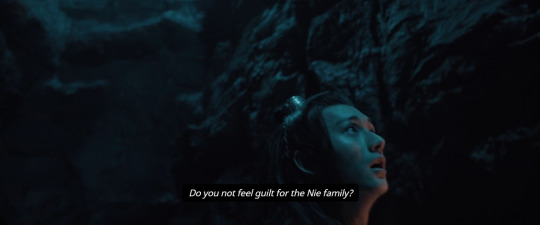
Jin Guangyao is willing to grovel and prostrate himself as a last resort, but I think fundamentally Jin Guangyao's motivated by the desire to get to a place where he never has to stoop that low again. He'll do it as many times as he needs to preserve himself! But he hates it, and he longs for dignity and respect. Huaisang is able to performatively debase himself for a decade and a half because his ego is already pretty shit. The flipside of all this, though, is that I think it functions as a rationalization/excuse with regards to whatever unsavoury methods NHS might employ. Positioning himself as relatively weak and helpless within his own mind, to whatever degree he’s doing so, is a disavowal of choice/agency/responsibility, as I was talking about at the beginning of the thread. To paraphrase, if you’re a 38 year old who has snorted ketamine in a Carp Tower bathroom and are the ruler of a major cultivation sect, it seems that you are not, in fact, “baby."
I have no doubt that Jin Guangyao thinks of his weaponization of other people's perceptions of him as exactly that, and for the most part I think he sees what others think of him as fundamentally incorrect. With Huaisang, the degree of separation is a bit less clear to me.
(Aside: Jin Guangyao's approach is informed by literally not having had the opportunity to become a strong cultivator and exert power in a more traditional way. I doubt that a Meng Yao raised in the Nie sect would abstain from pursuing cultivation the way Huaisang does, even if he knew the cost, because his mentality is to use any and all resources available to him. The tradeoff would be worth it in his eyes, imo anyway. Thinking about a Meng Yao who practices full-blown sabre cultivation... hahaha wow. What a nightmare!)
It's crucial for me to be able to enjoy the conclusion of the story that Huaisang is the one who Gets Jin Guangyao in the end, and by methods that largely aren't related to cultivation. The thing that does Jin Guangyao in isn't his social climbing, his “unsavoury” background, or his weak cultivation—though these get mobilized against him after the fact—but his vindictiveness, his obsession over past slights, and the other character traits that led to his killing Nie Mingjue. I doubt Huaisang would ever have lifted a finger against Jin Guangyao were he not his brother’s killer. It’s a personal vendetta undertaken in response to another personal vendetta, & rather than being punished for his ambition* by a righteous man who's done all the "right" things, his undoing comes from underestimating someone who has socially "failed" as a cultivator and a leader.
[YMMV & debatable on a metatexual level, but purely speaking to in-universe causation logic.]
I'm pretty haunted by the way that the moment Jin Guangyao realizes what Huaisang's done is surely the most Jin Guangyao's ever respected him, while the question of what Nie Mingjue would have thought of it hangs over Huaisang for the rest of his life. Out of 3zun, the one who would’ve been the most sympathetic in the abstract to Huaisang doing Alla That to make Jin Guangyao pay is... Jin Guangyao.
The betrayal of realizing Jin Guangyao is the reason Nie Mingjue died is arguably as traumatic for Huaisang as Nie Mingjue's death itself, because the situation becomes, "Not only is my only living family member prematurely dead in horrific circumstances but the one responsible is someone I thought of as my protector." Rightly or wrongly, he believes there's no human being left in the world he can trust or who actually cares about him, and this is how you get to the point of... That. it's grief over Nie Mingjue but it's also grief over... feeling connected to the broader human race?
And, in fairness, Huaisang has reason to be paranoid. Nie Mingjue is dead for crossing Jin Guangyao; WWX is dead for going against the status quo; LWJ was punished severely for supporting WWX and has receded from society completely (and they were never really friends anyway); JC has become completely irascible; Lan Xichen is devoted to Jin Guangyao. He doesn’t have much of a reason to believe that trying to seek justice in a straightforward way by reaching out to others will work out in any way but getting himself killed. It’s also how you arrive at a place of not only seeing everyone around you as a potential tool, but of systematically degrading yourself and rejecting the possibility of anyone around you being able to support you or know you in a genuine way.
I mentioned earlier that Huaisang gets styled, at various times, after each member of 3zun; his robes here are a clear match with the pattern and style of Xichen’s robes in a much earlier episode. This is my segue into talking Xisang for a bit.

I want to know at what point he decided Lan Xichen was a lost cause. Immediately? Or did he try and feel it out cautiously before deciding Jin Guangyao had his claws in him too deep to be convinced otherwise by Huaisang himself? Did he ever give Lan Xichen an opportunity to prove him wrong?
I doubt Jin Guangyao would've died at Guanyin Temple if Huaisang hadn't intervened via Lan Xichen, and there’s a way in which Jin Guangyao’s final decision to spare Lan Xichen at the last moment, which in my opinion came both out of love and out of a desire to leave something behind—someone who would remember him as he wanted to be seen, despite everything—plays off of Huaisang using Lan Xichen in this way. They both choose to let Lan Xichen live in his grief and guilt for the rest of his life, for one reason or another.
I think the cruelty and apathy Huaisang has towards Lan Xichen’s emotional well-being as shown by using him as a weapon comes from deep sadness and jealousy for what he represents to Jin Guangyao: specifically that despite all he’s done, Jin Guangyao still has someone who loves him that much. Huaisang doesn’t and probably believes he never will, that he’ll be alone with this forever.
The through-line of all of this is Huaisang’s social isolation, low self esteem, and (familial, inherited) fatalism. There’s also something to be said for his understanding of justice, & being motivated by justice, in a way I assume he connects to Nie Mingjue—I think the clothes Huaisang wears from Bicao and Sisi’s testimonies through Guanyin Temple point in this direction.

Huaisang has never applied himself more than he does to avenging Nie Mingjue, and I can’t help but think it comes from guilt, from wondering whether he could’ve done something sooner to protect Nie Mingjue had he been less carefree and naive. (It’s guilt both towards Nie Mingjue on a personal level as well as his generalized guilt towards his ancestors and the clan.) Of course, everything about Huaisang’s approach is antithetical to Nie Mingjue’s mentality, but rather than the subterfuge in and of itself, it’s Huaisang’s willingness to use others that Nie Mingjue would’ve recoiled from. This is what Nie Mingjue can’t forgive Jin Guangyao for—why are the lives of others more important than his own?. Huaisang and Jin Guangyao both sacrifice others in their pursuit of what they believe is a justified higher goal, with the implication that, rightly or wrongly, they believe they themselves need to live because they are individually too valuable to the cause; in their own minds, they aren’t expendable, while others are.
On the flipside, I think Huaisang’s attitude towards Lan Xichen re: culpability in the Jin Guangyao affair bears some resemblances to Nie Mingjue’s attitude towards Jin Guangyao’s responsibility for his killings at the Fire Palace; Huaisang measures Lan Xichen against a standard of what Huaisang believes he would’ve done in that situation and refuses to entertain the possibility that Lan Xichen could exist in a position between guilt and innocence. Huaisang is justified in holding Lan Xichen accountable, but that’s the problem; he doesn’t ACTUALLY hold Lan Xichen accountable, because that would require Huaisang confronting him & being upfront with Lan Xichen in the form of a conflict in which Lan Xichen could defend himself and possibly achieve closure. I think Huaisang looks at Lan Xichen and thinks, "This was all happening in front of you and you let it happen, which makes you complicit.” Is he right? Maybe, but Lan Xichen is emotionally and financially indebted to Jin Guangyao and was saved by him in the worst circumstances of his life! And more to the point, “if i were a member of the venerated triad i wouldve stopped it”/“rip to lan xichen but i’m different” is very funny considering Huaisang also did not realize anything was happening until it was too late, and was also on warm terms with Jin Guangyao just before Nie Mingjue’s death.

(Lan Xichen absolutely engaged in willful blindness for years, particularly in the face of Nie Mingjue’s clear concerns about Jin Guangyao that Lan Xichen did not want to believe, and consistently pushed at Nie Mingjue’s boundaries re: JGY, and i think ought to shoulder some blame. This thread makes good points about it. But, again, Huaisang himself was on good terms with Jin Guangyao prior to Nie Mingjue's death, so selectively assigning Lan Xichen guilt by proxy is, um, questionable.)
But I come back to the difference between Jin Guangyao’s last conversation with Lan Xichen, while he’s actively dying, where I think he’s being as honest as he’s capable of being—and, to be honest, I wonder whether Jin Guangyao really even knew how much he loved Lan Xichen until he was dying at his hands—as well as to the last conversations Huaisang has, with Lan Xichen and WWX, respectively. Even after it’s over, he won’t give a straight answer about his culpability or intentions, and won’t give Lan Xichen the most basic level of closure by telling him the truth. It’s very, “Here we are, the last two living people who loved them both, and if I have to live this way you do too." It’s crueler, to me, than making Lan Xichen stab Jin Guangyao in the first place, because it’s unnecessary. It's emotional cowardice, as well as profoundly sadistic. Which is all well and good, I guess, but I doubt he even really enjoyed any of this, stonewalling Lan Xichen included; for the love of god, at least Jin Guangyao experienced some sadistic pleasure at times. Please, someone, ANYONE, have fun with this wretched state of affairs.
Some part of Nie Mingjue still loved Jin Guangyao at the moment Jin Guangyao caused him to qi deviate, and some part of Huaisang still loved Jin Guangyao at the moment Nie Huaisang had him killed. Huaisang certainly isn’t going to get back the parts of himself he had to destroy to get there, and now he and Lan Xichen get to live with it.
To borrow from Louise Gluck: “Then I looked down and saw / the world I was entering, that would be my home. [...] And I said again, 'but the light will give me no peace.'”
188 notes
·
View notes